
Harris&Ewing Treasury Building, Fifteenth Street, Washington, DC 1918

• US adds 1,894 coronavirus deaths in 24 hours. Monday: 830, Sunday: 776.

Russia had its 10th consecutive day of more than 10,000 cases
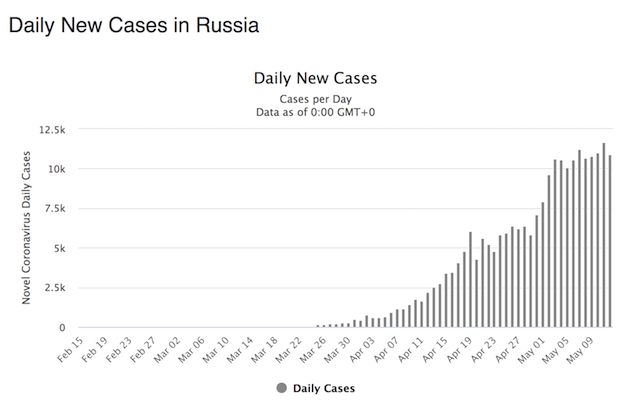

BREAKING: Coronavirus Outbreak
Very pleased to expand the Winners to 32 countries: Andorra, Australia, Austria, Bhutan, Cambodia, China, Croatia, Cuba, Djibouti, Estonia, Greece, Iceland, Jamaica, Jordan, Kosovo!, Latvia, Lebanon, Liechtenstein, Lithuania, Luxembourg,… pic.twitter.com/Q5mnGmu5sS
— Yaneer Bar-Yam (@yaneerbaryam) May 13, 2020
Everyone should evaluate their leaders by the outcomes.
— Yaneer Bar-Yam (@yaneerbaryam) May 13, 2020
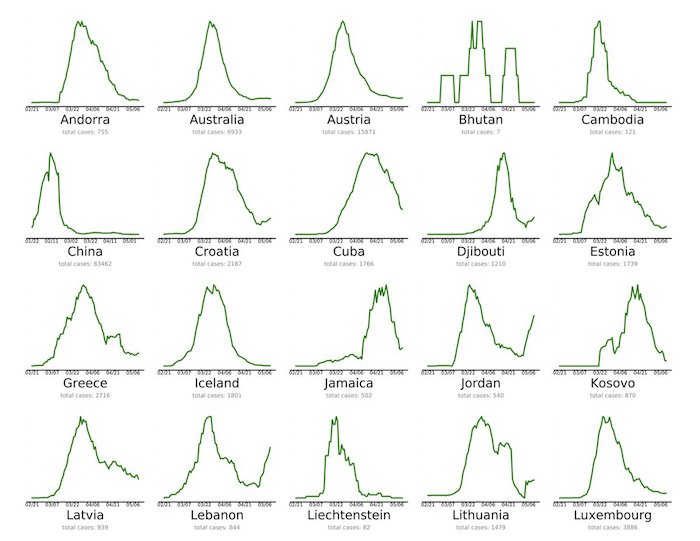
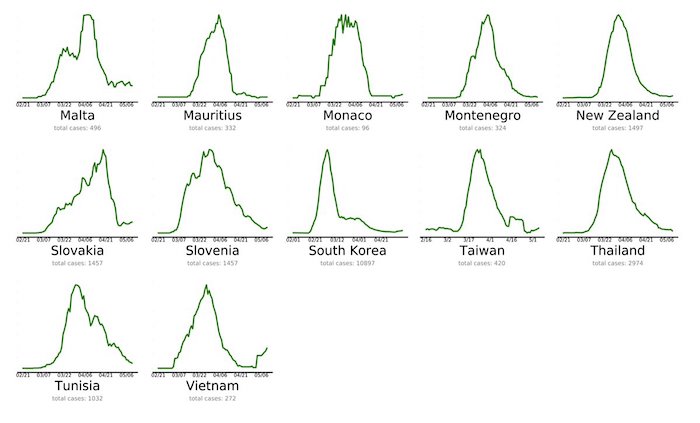

• Cases 4,358,220 (+ 85,116 from yesterday’s 4,273,104)
• Deaths 293,236 (+ 5,615 from yesterday’s 287,621)

From Worldometer yesterday evening -before their day’s close-
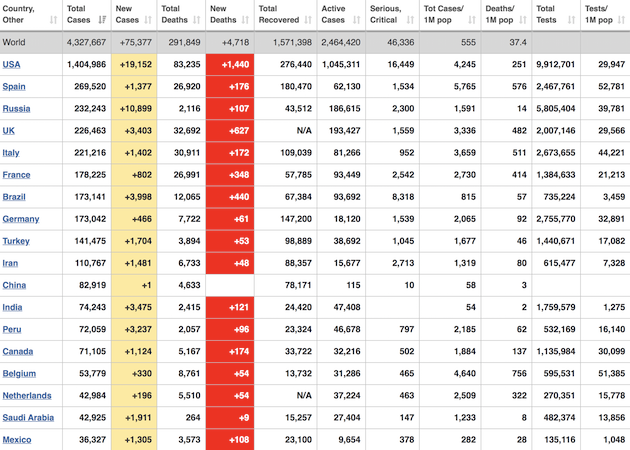
From Worldometer
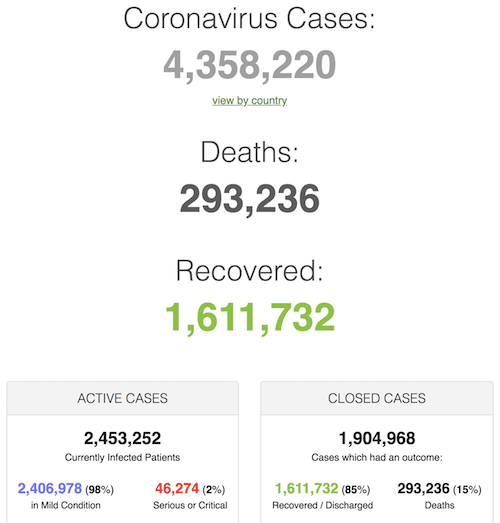
From SCMP:
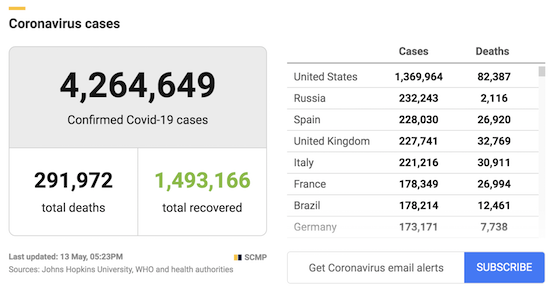
From COVID19Info.live:



Do the states that are doing well risk seeing their progress wiped out?
• Don’t Let Governors Fool You About Reopening (Yaneer Bar-yam)
In March, I called on the US to impose a strict five-week national lockdown with internal and external travel restrictions to bring us to near zero infections. While measures were taken in many parts of the country, it was too little, too late. Now, I and many others are issuing another warning: the decisions of some US governors to prematurely ease social distancing is a disastrous mistake and citizens need to ignore them. Our research — and common sense — show that lifting social restrictions will lead to an explosion of Covid-19 cases and cause countless more deaths. The correct way to relax restrictions is to start with parts of a state that are Covid-free for 14 days and allow only essential travel to those parts of the state with 14-day quarantines for inbound travelers. Why will going along with reopening lead to catastrophe?
First, we must understand that coronavirus is very deadly. Those who claim the death rate is exaggerated are plain wrong and downplaying the emergency. While death rate estimates have varied, recent data from China, the United Kingdom and France, reflecting deaths outside hospitals, including in nursing homes, puts the Covid-19 global fatality rate at around 6.8%, based upon analysis we did at endcoronavirus.org, using data from Johns Hopkins University. Second, almost all reopening states, from California to Pennsylvania, currently have a critical mass of new cases of existing infections that could see new outbreaks in the coming days and weeks. Third, without extreme preventive measures, we’ve seen how coronavirus infections doubled every two to three days at one point in different areas — which equated to about a tenfold increase per week.
That means that a state with 1,000 new cases could have well over 100,000 more in two weeks, if social distancing is loosened. States like Texas have announced precautions to mitigate harm from reopening with measures like limiting restaurants and shopping malls to operating at a 25% or 50% capacity depending on the amount of cases in their areas. But we know from months of studying this disease that communities need more aggressive measures to stop the exponential spread of Covid-19. We prevented the contagion from being much worse by putting in place protective measures throughout the US. We expanded testing capacity. We ramped up our hospitals’ capacity to care for critically ill patients. But this “flattening the curve” isn’t enough. If we lighten up on our protective measures now, all the progress we’ve made will vanish, and we’ll suffer an enormous setback. We need to push even harder to win.
Note the response to masks. Some people are "libertarians" because of a mental defect, a combination of severe inhibition of logical faculties coupled with sociopathic behaviors.
Others like @justinamash are genuinely multiscale localists. pic.twitter.com/IMQE2e6yiO
— Nassim Nicholas Taleb (@nntaleb) May 13, 2020
2) Many small professional resets: learned to lecture on Zoom. Learned to set up a blackboard behind me for illustrations.
Of course could start a business along these lines. Universities are going out of business & there is something to grab as they are too incompetent to adapt.— Nassim Nicholas Taleb (@nntaleb) May 11, 2020

View from the right wing.
• GOP Rejects Pelosi’s $3 Trillion HEROES Act Package (WE)
Senate Republicans flatly rejected a $3 trillion coronavirus aid package House Democrats introduced Tuesday and said they’ll wait to decide whether more legislation is necessary. “If we reach a decision, along with the administration to move to another phase, that’ll be the time to interact with the Democrats,” Senate Majority Leader Mitch McConnell told reporters Tuesday. “But what you’ve seen in the House is not something designed to deal with reality but designed to deal with aspirations. This is not a time for aspirational legislation. This is a time for practical response to the coronavirus pandemic.” Democrats blasted McConnell’s reaction to the massive bill.
Senate Minority Leader Chuck Schumer, a New York Democrat, accused McConnell of ignoring the desperate needs of people out of work and left without paychecks. “We need big, bold action, and yet, Leader McConnell seems totally divorced from that reality,” Schumer said. “We need to act in a big and bold way. The House has started the ball rolling. Republicans and the president ought to understand that and help us move in a big, bold way, not stand in the way.” The House measures are massive in both cost and scope. It provides new $1,200 cash payments to individuals and more than $1 trillion to state, local, and municipal governments. It includes a bailout for troubled state pensions and the U.S. Postal Service and “hazard pay” for healthcare workers and other workers who are unable to stay at home during the coronavirus.
Republicans have no appetite for the wide-ranging measure, they said. Congress has already enacted $2.8 trillion in federal coronavirus relief aid, and both the GOP and President Trump say they plan to wait for that funding to roll out and for economies to begin reopening before assessing the need for new federal spending legislation. Sen. John Thune, the majority whip, said the House bill “is nothing more than a messaging exercise by the House Democrats.” The South Dakota Republican said the bill “is not going anywhere” and said the Senate “will be working in a bipartisan way with the White House” when considering new coronavirus funding.

I think we can safely label this UBI. If people making up to $250,000 are eligible, the few percent that remain are negligible.
• House Bill Would Provide Some As Young As 16 With $2,000 Monthly Payments (JTN)
House Democrats are proposing a $2,000-a-month stimulus payment for individuals 16 and older to help them during the coronavirus. Reps. Ro Khanna of California and Tim Ryan of Ohio have introduced the proposal as stand-alone legislation titled the Emergency Money for the People Act. A spokesperson for Ryan’s office told Just The News on Tuesday that he is working with House leadership to include his bill in future coronavirus stimulus legislation. The Khanna-Ryan proposal would provide the monthly payments to qualified recipients for one year. To qualify, individual recipients must make less than $130,000 annually and couples filing joint tax returns would have to make less than $260,000.
The proposal has 37 co-sponsors including Reps. Rashida Tlaib, of Michigan, Alexandria Ocasio-Cortez, of New York, and Ted Lieu, of California. Khanna’s office said 16-year-olds would not have to file tax returns to qualify for the $2,000 per month. “They would have to fill out an online form that must be accessible via mobile phone to fill out” with their Venmo, Paypal, “other mobile money or direct deposit” information, a Khanna spokesperson said. Khanna’s office also told Just The News that illegal immigrants and non-citizens who file tax returns with tax ID numbers would qualify for the monthly direct payments in the bill.

Here’s what you get for rejecting Medicare For All.
• HEROES Act Delivers A Win To The Health Insurance Industry (IC)
The Heroes Act, the new coronavirus relief bill introduced by House Democrats on Tuesday, includes protections for employer-sponsored insurance plans, which the health care industry has been lobbying Congress on for weeks. The proposed legislation includes subsidies for continued coverage for furloughed workers and people using COBRA, a continuing health coverage plan for those who have lost work, even if they don’t pay their premiums. The bill also creates avenues for premium assistance for certain categories of people who want to pay those premiums anyway and would open a special insurance enrollment period a week from the date it’s enacted into law. It also provides nine months of premium payments to health insurance plan administrators who don’t receive them during the ongoing pandemic.
The push to protect insurance premiums comes as some health care companies, like UnitedHealth, Humana, and Cigna, have reported profits during the pandemic amid record-high unemployment levels and have boasted that they don’t expect to take a financial hit. In late April, dozens of industry groups — including the influential, conservative Chamber of Commerce — sent a letter to congressional leadership asking for direct subsidies for COBRA, expanding uses for health savings accounts, and increasing eligibility to access health insurance marketplaces.
A couple of weeks earlier, the nations’ second-largest health insurance lobby, America’s Health Insurance Plans, joined a congressional call with members of the conservative Democratic Blue Dog Caucus to ask for protections for employer coverage. According to two sources familiar with the April 13 call, AHIP’s CEO discussed the importance of protecting employer-sponsored plans. One person on the call, who works for an insurer and was not authorized to speak publicly about the conversation, said AHIP’s push for targeted relief to employers who pay premiums to insurance companies was puzzling, given that insurance companies have seen recent profits.

The US is no longer capable of passing any law without both parties appropriating huge sums of money to their corporate sponsors. Every single bill that is passed increases inequality.
• US Fossil Fuel Giants Set For A Coronavirus Bailout Bonanza (G.)
Fossil fuel companies and coal-powered utilities in the US are set for a potential bonanza under federal government plans for a bond bailout, part of the rescue package for the coronavirus crisis. At least 90 fossil fuel companies, many of them established giants such as ExxonMobil, Chevron and Koch Industries, stand to gain from the Federal Reserve’s coronavirus bond buyback programme, alongside more than 150 utilities including coal-heavy firms such as American Electric Power and Duke Energy, according to a new analysis. The bond buyback scheme is expected to be worth at least $750bn altogether and to benefit thousands of companies by the end of September, and the size of the payout that could go to fossil fuels and utilities is as yet unknown.
The scheme is to be discussed in the US Senate on Tuesday. Jason Disterhoft, a senior campaigner at Rainforest Action Network, which conducted the study, said public money should be used to bail out companies only with strict conditions attached. “Our concern is that these recovery funds should be prioritising people and communities and they are going instead to big companies to pay down their debts,” he said. Ten out of the top 40 fracking companies would be eligible to apply, according to the analysis, which examined all US fossil fuel companies and energy utilities to check whether they would qualify under the published scheme rules. It is not known whether any of these companies will apply for the support, though many are expected to do so.

The modeling gets more useless with each update. Just say you don’t know.
• US COVID19 Death Forecast Revised Upward Again (R.)
The latest forecast here from the University of Washington’s Institute for Health Metrics and Evaluation (IHME) reflects “key drivers of viral transmission like changes in testing and mobility, as well as easing of distancing policies,” the report said. The revision reinforced public health warnings, including U.S. Senate testimony on Tuesday from Dr. Anthony Fauci, the nation’s top infectious disease expert, that prematurely lifting lockdowns could lead to more outbreaks of the respiratory virus. Fauci and other medical experts have urged caution in relaxing restraints on commerce before diagnostic testing and the ability to trace close contacts of infected individuals can be vastly expanded, along with other safeguards.
IHME researchers acknowledged that precise consequences of moves to reopen shuttered businesses and loosen stay-at-home orders are difficult to gauge. “The full potential effects of recent actions to ease social distancing policies, especially if robust containment measures have yet to be fully scaled up, may not be fully known for a few weeks due to the time periods between viral exposure, possible infection and full disease progression,” the report said. COVID-19 has already claimed nearly 81,000 lives in the United States, out of more than 1.36 million known infections, according to a Reuters tally.
[..] The projections are presented as a range, with the latest forecast – 147,00-plus deaths – representing the average between a best-case scenario of 102,783 lives lost and a worst-case scenario of 223,489 fatalities. The forecasts have fluctuated over the past couple of months, with a projected death toll as low as 60,000 on April 18.

It’s become normal to label remdesivir an “experimental COVID-19 treatment”.
• Gilead Ties Up With Generic Drugmakers For COVID19 Drug Supply (R.)
Gilead Sciences Inc said on Tuesday it has signed non-exclusive licensing pacts with five generic drugmakers based in India and Pakistan to expand the supply of its experimental COVID-19 treatment remdesivir. The pacts allow the companies – Jubilant Life Sciences Ltd, Cipla Ltd , Hetero Labs Ltd, Mylan NV and Ferozsons Laboratories Ltd – to make and sell the drug in 127 countries. The countries consist of nearly all low-income and lower-middle income ones, as well as several that are upper-middle- and high-income, the drugmaker said. Afghanistan, India, North Korea, Pakistan and South Africa are among the countries.
The licensees will also set their own prices for the generic product they produce, Gilead said. The licenses are royalty-free until the World Health Organization declares the end of the public health emergency regarding COVID-19, or until a product other than remdesivir or a vaccine is approved to treat or prevent COVID-19, the company said. Gilead’s antiviral drug remdesivir earlier this month received the U.S. Food and Drug Administration’s emergency use authorization to treat COVID-19 patients.

Rising in the charts. Close the borders.
• Mexico Sees 353 Deaths In Most Lethal Coronavirus Day (R.)
Mexico’s health ministry confirmed 1,997 new cases of coronavirus infections on Tuesday, along with 353 additional deaths, the most deadly day since the pandemic began. The new infections brought confirmed coronavirus cases to 38,324 and 3,926 deaths in total, according to the official tally. Mexico’s previous highest daily death toll was on Thursday, when Mexico reported 257 fatalities.

It’s easier for islands. And Cuba has a much better health care system than just about any country, that helps too.
• Cuba Begins Mass Testing For COVID19 With Fewer Than 20 New Cases Per Day (G.)
Cuba has begun mass testing for coronavirus as it appeared to have contained infections, amid a partial shutdown that has exacerbated a shortage of basic goods. New cases have fallen to fewer than 20 per day from a peak of around 50 in April. Since the first Covid-19 illness was reported two months ago, there have been 1,804 confirmed cases, of which 70.7% have recovered and 78 people have died. Cuba has closed its borders and the tourism industry, schools and public transportation. Masks are mandatory and eating at restaurants, bars and social gatherings prohibited. Cubans have been urged to stay at home and practice social distancing.
But the public has not been confined to quarters and has taken to trudging about in search of basic supplies, waiting in long lines and even dusting off bicycles from the dark days following the fall of the Soviet Union. [..] While Communist-run Cuba’s universal and free healthcare system has proved key in containing Covid-19, the pandemic has exacerbated shortages of basic goods and a chaotic retail system caused largely by US sanctions and the centralized, state-dominated economy. Cuba’s top epidemiologist, Francisco Durán, said on Monday that mass testing would help better define the prevalence of the coronavirus as many people found to be infected showed no symptoms.
“The objective is to find new cases and then intervene, isolate, seek contacts, and take all possible measures to ensure that Cuba continues as it is now,” he said during his daily virus update broadcast to the nation. Many experts believe Cuba has managed to control the outbreak better than many countries in the region due to its well-staffed preventive healthcare system, mobilization of activists to track cases, a centralized system that allows a better focus, and willingness to quarantine large numbers of people. Cuban scientists announced last week they had adapted a computerized system developed locally to quickly detect antibodies of the new virus, allowing for mass testing in hospitals and clinics at little cost. Until now, the Caribbean island nation has used expensive tests – often donated – that take days to process, old-fashioned door knocking by health personnel and medical students to trace contacts, and isolation.

Organizing at a small-scale level works.
[..] there is no unchecked, devastating COVID-19 epidemic in Hong Kong. The city beat back the original wave, and also beat back a second resurgence due to imported cases. But unlike in Taiwan or South Korea, this success can’t be attributed to an executive that acted early and with good governance backed by the people. The secret sauce of Hong Kong’s response was its people and, crucially, the movement that engulfed the city in 2019. Seared with the memory of SARS, and already mobilized for the past year against their unpopular government, the city’s citizens acted swiftly, collectively, and efficiently, in effect saving themselves. [..]
On the very day the first known coronavirus case in Hong Kong was announced, the same protest team behind the candidate information sites immediately created a new website—this time to track cases of COVID-19, monitor hot spots, warn people of places selling fake PPE, and report hospital wait times and other relevant information. Many of the key information sources for Hong Kong protesters had been anonymous channels in the popular app Telegram and their own online forums. These anonymous formats protected the protesters from government repression but created a constant threat of misinformation, as someone could always pretend to be a protester or just be wrong or trolling.
Consequently, the protesters learned to become incessant fact-checkers, used to looking up multiple sources and critically analyzing information. Now they turned their powers to critical analysis to the coronavirus: criticizing their own officials, as well as the World Health Organization, which did not advise wearing masks or travel restrictions, and China, which they saw as covering up the initial epidemic (they were right on all counts). In response to the crisis, Hong Kongers spontaneously adopted near-universal masking on their own, defying the government’s ban on masks. When Lam oscillated between not wearing a mask in public and wearing one but incorrectly, they blasted her online and mocked her incorrect mask wearing.
In response to the mask shortage, the foot soldiers of the protest movement set up mask brigades—acquiring and distributing masks, especially to the poor and elderly, who may not be able to spend hours in lines. An “army of volunteers” also spread among the intensely crowded and often decrepit tenement buildings to install and keep filled hand-sanitizer dispensers. When the government refused at first to close the border with mainland China, more than 7,000 medical workers went on an unprecedented strike, demanding border closures and PPE for hospital workers. This strike was only possible because labor unions were formed during the protests. Now they came in handy for collective action.

Since the recovery is 100% sure to be uneven, the ‘Existential Threat’ is inevitable.
• EU Faces ‘Existential Threat’ If Coronavirus Recovery Is Uneven (G.)
The risk of an uneven economic recovery from the coronavirus crisis poses an “existential threat” to the European Union, one of its most senior economic policymakers has said. Paolo Gentiloni, a former Italian prime minister and now the EU’s economy commissioner, said the bloc also had a “historic opportunity” as it charts a plan to rescue Europe’s economy. In an interview a few days after the commission said Europe had entered “the deepest economic recession in its history”, Gentiloni said the EU needed a “sound recovery plan” to avoid the risks of economic division. Shuttered shops and factories, grounded planes and stay-at-home consumers as a result of lockdown restrictions mean the EU economy is expected to shrink by 7.5% in 2020, a deeper fall than the 2009 financial crisis.
Gentiloni is concerned that countries do not have the same resources to recover from this economic shock. The hardest hit countries – Greece, Italy, Spain and Croatia – face falls in economic output (GDP) in excess of 9% in 2020, while Germany’s economy is set to contract by 6.5% and Austria’s by 5.5%. Meanwhile countries have varying levels of state resources to rescue ailing companies and pay workers’ wages – emergency measures that have become easier since Brussels relaxed state aid rules to deal with the crisis. Gentiloni said state aid requests from EU member states were very imbalanced.
“What is clear is the uneven level of the recovery and the risks this creates to our single market and the necessary convergence, especially within the euro area. This is something that I could even define as an existential threat to the building of the Union,” he told a group of European newspapers, including the Guardian. “If we want to look from a more optimistic way it is not only an existential threat but also in some sense a historic opportunity to fill the void we have in common tools of economic and fiscal policies.”

Good.
• China’s April Air Passenger Numbers Down 68.5% Year-on-Year (R.)
China’s passenger numbers fell 68.5% in April from a year ago, for a drop smaller than in March, the aviation regulator said on Wednesday, pointing to a fragile industry recovery from the coronavirus pandemic as other nations reopen economies. The global tourism industry is closely watching trends in China for clues to travel patterns in other major markets as countries race to lift travel curbs. Air passengers numbered 16.72 million in April, Xiong Jie, a spokesman of the Civil Aviation Administration of China, told an online news conference. That compared with a decline of 71.7% on the year in March, when passengers numbered 15.13 million.
China’s tourism sector showed encouraging signs of recovery over the May Day holiday with 115 million trips made, many by car and by younger people emerging from weeks of virus lockdown measures. More than 30% of capacity has returned in the Chinese domestic market in the last two months, aviation data provider Cirium said on Tuesday. But the number of passenger flights in China has not yet recovered to 60% of the levels seen in past years, Jin Junhao, another CAAC official, sadi during Wednesday’s conference.

There are few places where you’re more likely to get infected than inside a plane (or a train, subway).
• US Airlines Tell Crews Not To Force Passengers To Wear Masks (R.)
The top three U.S. airlines have told their flight attendants not to force passengers to comply with their new policy requiring face coverings, just encourage them to do so, according to employee policies reviewed by Reuters. American Airlines , Delta Air Lines and United Airlines have told employees that they may deny boarding at the gate to anyone not wearing a face covering, and are providing masks to passengers who do not have them, the three carriers told Reuters. Inside the plane, enforcement becomes more difficult.
“Once on board and off the gate, the face covering policy becomes more lenient. The flight attendant’s role is informational, not enforcement, with respect to the face covering policy,” American told its pilots in a message seen by Reuters explaining its policy, which went into effect on Monday. “Bottom line to the pilots: a passenger on board your aircraft who is being compliant with the exception of wearing a face covering is NOT considered disruptive enough to trigger a Threat Level 1 response,” referring to some kind of intentional disruption by a passenger that could cause the captain to divert the flight. American spokesman Joshua Freed said: “American, like other U.S. airlines, requires customers to wear a face covering while on board, and this requirement is enforced at the gate while boarding. We also remind customers with announcements both during boarding and at departure.”
[..] U.S. travel demand has fallen by about 94% in the midst of the coronavirus pandemic, prompting carriers to slash their flying schedules to roughly 30% of normal this month. With fewer planes in the skies, some are flying near capacity. Global airlines body IATA came out last week in favor of passengers wearing masks onboard, as debate intensifies in the United States on the role that government agencies should play in mandating new safety measures for flying before a vaccine is developed.

Certainly in 2016, there was no way to become US ambassador to Ukraine without the approval of Victoria Nuland et al. So another “hero” falls.
• Contacts Exposed Between US Kyiv Embassy, Yovanovitch, Burisma (Solomon)
During President Trump’s impeachment, former U.S. Ambassador Marie Yovanovitch testified to Congress that she knew little beyond an initial briefing and “press reports” about Burisma Holdings, the Ukrainian natural gas firm that had hired Vice President Joe Biden’s son Hunter and was dogged by a corruption investigation. “It just wasn’t a big deal,” she declared under oath on Oct. 11, 2019. But newly unearthed State Department memos obtained under the Freedom of Information Act show Yovanovitch’s embassy in Kiev, including the ambassador herself, was engaged in several discussions and meetings about Burisma as the gas firm scrambled during the 2016 election and transition to settle a long-running corruption investigation and polish its image before President Trump took office.
Yovanovitch, for instance, was specifically warned in an email by her top deputy in September 2016 — three years before her testimony — that Burisma had hired an American firm with deep Democratic connections called Blue Star Strategies to “rehabilitate the reputation” of the Ukrainian gas firm and that it had placed “Hunter Biden on its board,” the memos show. She also met directly with a representative for Burisma in her embassy office, less than 45 days before Trump took office, a contact she did not mention during her impeachment deposition. The discussions about Burisma inside Yovanovitch’s embassy were so extensive, in fact, that they filled more than 160 pages of emails, memos and correspondence in fall 2016 alone, according to the State Department records obtained under FOIA by the conservative group Citizens United.
[..] The impeachment hearings last fall, which focused on efforts by Trump and his lawyer Rudy Guiliani to find evidence inside Ukraine on the Bidens and Burisma and to remove Yovanovitch from her job as U.S. ambassador, included testimony from Yovanovitch herself. During that deposition in October 2016, she made no mention of direct contact with Burisma representatives and instead suggested her knowledge about the company and its legal travails was limited mostly to a briefing she received in preparation for Senate confirmation as ambassador in summer 2016 and subsequent news media reports.

Curious decision.
• Judge Delays Flynn Dismissal Decision, Invites Outside Opinions (JTN)
US District Judge Emmet Sullivan on Tuesday delayed a decision on whether to dismiss Michael Flynn’s conviction for lying, indicating he plans to allow for the submission of outside opinions in the form of amicus curiae briefs. Last week, the Justice Department moved to drop the charges against Trump’s former national security advisor, but the judge’s plan to allow for the submission of friend of the court briefs means that the case will not be closed immediately. Sullivan has not issued a decision on the DOJ’s request to drop the charges. Flynn’s legal team blasted the idea of allowing for the submission of amicus briefs, which allow for parties interested in but not involved in a case to present their views.
“It is no accident that amicus briefs are excluded in criminal cases,” Flynn’s lawyers wrote in a filing according to The Hill. “A criminal case is a dispute between the United States and a criminal defendant. There is no place for third parties to meddle in the dispute, and certainly not to usurp the role of the government’s counsel. For the Court to allow another to stand in the place of the government would be a violation of the separation of powers.” Flynn in 2017 pleaded guilty to lying to the FBI, but later sought to withdraw his guilty plea. Evidence that has since emerged suggested the FBI had no case against Flynn but set up an interview in hopes it would catch him lying, his lawyers and Justice officials have said.

We try to run the Automatic Earth on people’s kind donations. Since their revenue has collapsed, ads no longer pay for all you read, and your support is now an integral part of the process.
Thank you.

Hey, @McConaughey! My guy @HenryRodgersDC and I would love to hop on zoom with you for the @DailyCaller, drink a beer and figure out a way to save lives/raise awareness during the coronavirus pandemic.
Together, we’ll win this war. Let’s make it happen! pic.twitter.com/Npb37vvg3J
— David Hookstead (@dhookstead) May 13, 2020

3D printed Möbius gears pic.twitter.com/K77rzG9jnA
— mood:odd (@moododd) April 22, 2020

Support the Automatic Earth in virustime.







